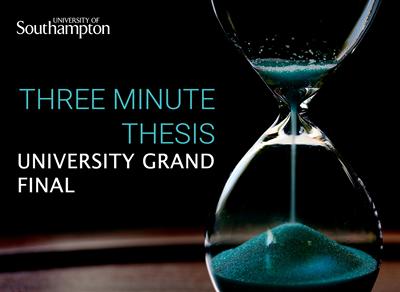
The Southampton Three Minute Thesis (3MT®) is one of many such competitions held world-wide and 2020 was our seventh year of Three Minute Thesis at Southampton. The competition runs annually as part of our Festival of Doctoral Research, and this year we held the competition online.
The University 3MT winner, runner up and people's choice winner were announced at the Doctoral College Awards Ceremony on Tuesday 30 June 2020, by Professor Chris Howls, Director of the Doctoral College.
Finalists were competing for:
1st Prize - £500 to support their research
2nd Prize - £250 to support their research
People’s Choice - £500 to support their research
The Winners
University 3MT Champion
James Easton, Faculty of Engineering and Physical Sciences (School of Chemistry)
Runner up
Daniel Wallace, Faculty of Engineering and Physical Sciences (School of Engineering)
People’s Choice
Daniel Wallace, Faculty of Engineering and Physical Sciences (School of Engineering)
Judging Panel
Allison Stratford, Head of Corporate Communications
Jo Lisney, VP Education & Democracy, SUSU
Kieron Broadhead, Executive Director of Student Experience
Mylene Ployaert, Head of Research Funding Development, Research and Innovation Services
Nikhil Mistry, Research Fellow, School of Ocean and Earth Sciences (and PeRU Associate)
Congratulations to all our finalists!
Just scroll down to watch the 3MT University finalists in action!